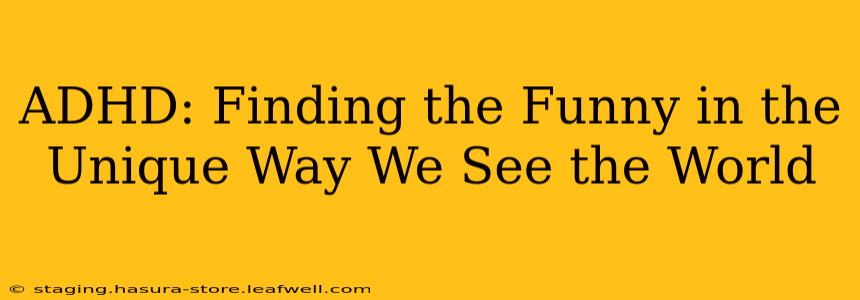Living with ADHD presents a whirlwind of challenges, from executive dysfunction to hyperfocus on the most unexpected things. But amidst the whirlwind, there's a unique perspective, a comedic lens through which the world unfolds in a hilariously chaotic way. This isn't about making light of the struggles; it's about celebrating the often absurd humor that comes with experiencing life a little…differently. This article explores the funny side of ADHD, recognizing both the challenges and the unexpected joys.
What are the common challenges of ADHD?
ADHD, or Attention-Deficit/Hyperactivity Disorder, is a neurodevelopmental disorder impacting focus, attention, and impulse control. Common challenges include difficulty concentrating, hyperactivity (physical restlessness or internal mental restlessness), impulsivity (acting without thinking), and organizational struggles. These challenges can significantly affect daily life, impacting academics, work, and relationships. However, the very traits that can create difficulties also often lead to unique perspectives and unexpected bursts of creativity.
Is ADHD a disability?
Yes, ADHD is considered a disability under the Americans with Disabilities Act (ADA) and similar legislation in many other countries. This recognition acknowledges the significant challenges ADHD can pose and provides legal protections for individuals with ADHD in areas such as employment and education. The severity of the disability can vary greatly from person to person, but the challenges are real and can impact various aspects of life. The key is understanding and managing these challenges, not diminishing their impact.
How does ADHD affect my sense of humor?
The hyperactive mind of someone with ADHD often processes information differently, leading to unconventional connections and unexpected observations. This can manifest as a unique brand of humor. For example, the tendency towards hyperfocus can lead to hilarious moments of intense concentration on seemingly insignificant details, while the impulsive nature can result in witty, off-the-cuff remarks that surprise and delight. The constant stream of thoughts can be a source of endless, albeit sometimes chaotic, comedic material.
What are some funny things about ADHD?
Many people with ADHD relate to the humor found in the everyday absurdities of their lives. This could include:
- The "lost object" saga: The frantic search for misplaced keys, phones, or glasses—a comedic staple for anyone with ADHD.
- Hyperfocus on niche topics: Suddenly becoming an expert in a subject matter completely unrelated to current tasks. Think spending hours researching the mating habits of Bolivian tree lizards instead of finishing that crucial work project.
- The "brain fog": That moment when you completely forget what you were just talking about, leaving everyone else staring blankly.
- The endless to-do list: A constantly evolving document that seems to grow faster than it can be completed.
- The unexpected tangents: Conversations veering wildly off course, resulting in side-splitting anecdotes that have little to do with the original topic.
How can humor help manage ADHD?
Humor acts as a powerful coping mechanism. Laughing at the absurdity of ADHD symptoms can help manage feelings of frustration and self-criticism. It provides a healthy outlet for processing the challenges and finding perspective. Sharing these experiences with others—either through writing, storytelling, or simply connecting with others who understand—can also foster a strong sense of community and reduce feelings of isolation.
Can humor be used as therapy for ADHD?
While not a replacement for professional therapeutic interventions, humor can be a valuable tool in managing ADHD. Humor therapy, a type of supportive therapy, can help individuals develop coping skills and build resilience by focusing on the positive aspects of their lives and using humor to process difficult emotions and experiences. It’s important to note that professional help, like therapy or medication, remains crucial for effective management of ADHD symptoms.
Conclusion
Living with ADHD is a unique experience, filled with both challenges and unexpected joys. By embracing the humor found in the often-absurd realities of ADHD, we can foster resilience, build community, and gain a fresh perspective on life. It’s about finding the laughter in the chaos and celebrating the wonderfully weird way we see the world. Remember to seek professional guidance when needed; understanding your ADHD and finding coping mechanisms can empower you to thrive.

